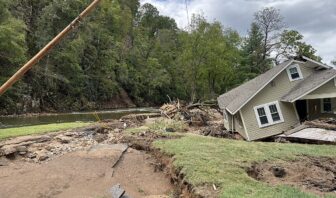CSX and Norfolk Southern lose unprecedented lawsuit aimed at keeping records secret
BALTIMORE—A state judge ruled Friday that Maryland residents have a right to access information about the movement of dangerous and potentially explosive crude oil trains in their communities.
Rail companies CSX and Norfolk Southern had sued the Maryland Department of the Environment last summer to prevent the state from releasing information about the routes and estimated amounts of crude oil traveling through the state. But Baltimore Circuit Court Judge Lawrence Fletcher-Hill ruled on Friday that the public has a right to access this information under the Maryland Public Information Act (PIA). In separate orders against CSX and Norfolk Southern, the judge found the rail companies’ arguments for confidentiality without merit. Judge Fletcher-Hill’s ruling will take effect September 4, 2015, pending appeals from the rail companies.
“This is a significant victory for transparency and for Maryland residents living along the path of oil trains,” said Anne Havemann, General Counsel for the Chesapeake Climate Action Network. “Judge Fletcher-Hill affirmed that communities have a right to know whether dangerous oil trains are running through their backyards. Shedding light on the risks is the first step toward stronger state and local action to safeguard our communities.”
After the federal government enacted an emergency “transparency” order last year requiring railways to alert states about upcoming shipments of so-called Bakken crude oil, the companies pushed states to sign nondisclosure agreements. Maryland was one of only 14 states that signed an agreement.
The lawsuit was triggered by a PIA request from news outlets McClatchy and the Associated Press and represented the first time a railroad had gone to court to prevent disclosure. CCAN, along with the Environmental Integrity Project, also filed a request for information under the PIA on August 8, 2014, asking for rail shipment information provided to MDE by CSX and Norfolk Southern.
The federal government has made clear that route information is not exempt from the federal sunshine laws. The most recent directive from the Federal Railroad Administration reiterated the government’s commitment to transparency. “Transparency is a critical piece of the federal government’s comprehensive approach to safety,” said U.S. Transportation Secretary Anthony Foxx. “And we understand the public’s interest in knowing what is traveling through their communities.”
Previously, advocates used mapping data and eyewitness accounts to estimate where the trains traveled through Maryland and Baltimore in particular. Analysis of the mapping data paired with census data indicates that 165,000 Baltimore residents live within the potential impact zone of an oil train derailment, as defined by the U.S. Department of Transportation.
The Maryland court ruling applies to trains carrying crude oil from the fracked oil wells of North Dakota. These trains have routinely derailed and exploded across the country. The worst explosion happened two years ago, when a train derailed in Lac-Megantic, Quebec, killing 47 people and incinerating 30 buildings.
The judge’s decision comes on the heels of a “Stop Oil Trains” rally and oil train public information hearing in Baltimore City in early July. Residents expressed their concern about the safety and health hazards of oil trains that already roll through the city in large numbers. One company shipped more than 100 million gallons of crude oil out of the Fairfield Peninsula in South Baltimore over the years 2013 and 2014 (up from zero gallons the previous two years). Other companies have applied for permits to build additional export facilities in the city.
Community, environmental, and public safety advocates are calling on the Baltimore City Council and mayor to pass an ordinance that would temporarily halt expansion of crude oil terminals until the city can study the health and safety risks of transporting the dangerous cargo through the city.
View Judge Fletcher-Hill’s opinion in CSX v. Maryland Department of the Environment: http://chesapeakeclimate.org/wp-content/uploads/2015/08/CSX-Transportation-Inc.-v.-MDE-Memorandum.Opinion.pdf
View Judge Fletcher-Hill’s opinion in Norfolk Southern v. Maryland Department of the Environment: http://chesapeakeclimate.org/wp-content/uploads/2015/08/Norfolk-Southern-Railway-Company-v.-MDE-et-al-Memorandum-Opinion-Order.pdf
###
The Chesapeake Climate Action Network is the biggest and oldest grassroots organization dedicated to fighting climate change in Maryland, Virginia, and Washington, D.C. We’re building a powerful movement to shift our region away from climate-harming fossil fuels and to clean energy solutions.




